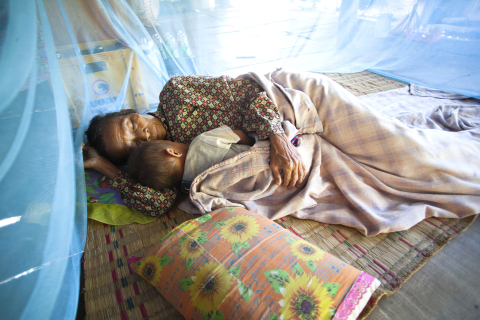Country leaders and all partners must urgently step up efforts to get the fight against malaria back on track or risk seeing cases and deaths substantially increase in the coming years
New findings published today by the World Health Organization (WHO) in its annual World Malaria Report show that the disease remains a deadly threat to millions worldwide.
The RBM Partnership to End Malaria calls on country leaders, donors, and policy makers to increase their malaria efforts and get the fight against this disease back on track or risk seeing cases and deaths rise substantially in the coming months and years.
The latest report shows that the efforts of teams across the globe and investments made to strengthen health systems have paid dividends, with an estimated 185 million malaria cases and 997,000 deaths averted in 2021. Many countries within reach of eliminating malaria continued to make progress. Following a substantial rise in deaths during the first year of the COVID-19 pandemic, the number of deaths in 2021 did not increase further. All this was achieved thanks to countries’ heroic efforts and strong partnerships despite the significant challenges that countries faced over this period, including the ongoing pandemic and rising biological threats.
Global malaria cases also remained stable overall, rising by 2 million to 247 million. Positively, this increase was at a slower rate than between 2019 and 2020. Yet, the fight against malaria remains at a precarious juncture, especially in Africa, where the malaria burden remains disproportionately high, equating to 95% of cases and 96% of deaths globally.
Threats to malaria control, which include the limited roll out of existing tools, emerging resistance to drugs, insecticides, and diagnostics, and the increased costs of procurement and delivery, mean the funding required to get back on track to achieve global malaria 2030 targets is now even greater than before. Ongoing humanitarian crises and a global economic downturn this year could further jeopardise what is already a precarious situation.
The RBM Partnership to End Malaria calls on all countries to continue investing in the fight against malaria. Investments are needed to strengthen the health system so that all those in need can access and use effective and targeted malaria tools tailored to local data and receive quality health services in a primary care setting. While the current tools are cost effective, investments are also needed to develop and scale up better tools and innovative solutions. As WHO identifies, there are promising opportunities to scale up Pyrethroid-PBO nets, continued ITN trials, new vector control products, vaccines in development, passive immunization with monoclonal antibodies in the area of chemoprevention and new diagnostic tests.
Dr Corine Karema, Interim CEO of the RBM Partnership to End Malaria, comments:
“I would like to commend everyone across the National Malaria Programmes and Ministries of Health, which have demonstrated immense resilience through the worst times. Thanks to their efforts and the support of all partners, including donors, many lives were saved, and the global malaria picture is not as bad as it could have been.
However, multiple threats are converging and undermining progress toward achieving our global malaria goals.
We welcome the significant pledges made by donors worldwide to September’s Global Fund Replenishment. But while the Global Fund raised its largest total – a monumental achievement in a challenging economic environment – we still face a shortfall to end malaria, although the significant funding and technical support by other key donors such as the Presidential Malaria Initiative, and the Bill and Melinda Gates Foundation and others will help. We must continue to protect the investments made to date with increased funding; otherwise, the gains made in the last few decades can too easily be reversed.
I remain hopeful we can defeat this disease by continuing to work together. The threat of malaria requires an urgent response, and our continued commitment to innovation will be essential; the malaria parasite and mosquitoes that spread the disease are constantly evolving to resist even our most effective tools, meaning we must stay one step ahead through investment in R&D. But we have a promising R&D pipeline. We can accelerate progress by optimising and targeting all the effective tools we already have for maximum impact.
Elimination is possible. Since 2000, over 20 countries worldwide have reached the target of zero malaria cases, and other countries are close. Strengthening country leadership, regional coordination, and scaling up disease surveillance will be pivotal to controlling malaria cases and eliminating the disease in these countries. Supporting them as they approach elimination is critical to achieving a zero malaria world.”
– ENDS –
Contact:
For further comment or an interview please contact the RBM Partnership Press Office at RBMPartnership@grayling.com
About the RBM Partnership to End Malaria
The RBM Partnership to End Malaria is the largest global platform for coordinated action against malaria. Originally established as Roll Back Malaria (RBM) Partnership in 1998, it mobilizes for action and resources and forges consensus among partners. The Partnership comprises more than 500 partners, including malaria endemic countries, their bilateral and multilateral development partners, the private sector, nongovernmental and community-based organizations, foundations, and research and academic institutions. The United Nations Office for Project Services (UNOPS) in Geneva, Switzerland, hosts the RBM Partnership Secretariat.
Facebook: @RBMPartnership
Twitter: @endmalaria
